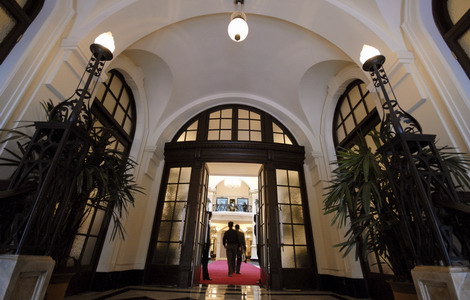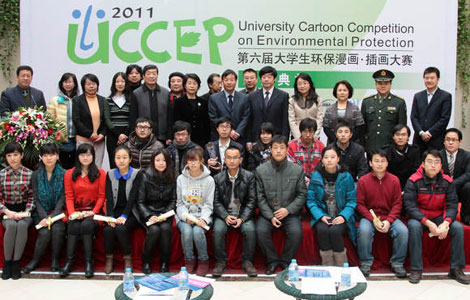Luxury hotels target Chinese customers
Updated: 2012-01-02 09:15
By Tania Lee (China Daily)
|
|||||||||||
|
 |
|
The "super five-star" Waldorf Astoria hotel in Shanghai, which opened in April 2011. Hotel operators continued to strengthen their foothold in China in 2011 despite the competitive market. Demand has mainly stemmed from the increasingly wealthy domestic customers. According to a report, China had 960,000 individuals with a personal wealth of $1.5 million or more in 2010. [Photo / China Daily] |
BEIJING - The beginning of the recovery for China's hotel market began in 2010 and in 2011 demand increased further for rooms.
Hotel executives still believe that China is a safe haven for luxury hotels, despite the occupancy rate for 2011 hovering at around 60 percent.
"We haven't felt the crisis that they are experiencing in the US and Europe," said Charlie Dang, general manager of Northern China for Starwood Hotels & Resorts Worldwide Inc, owner of nine hotel chains including the St. Regis, Sheraton, Westin and W brands.
"The domestic economy is still very strong. Generally the second- and third-tier cities are growing rapidly and that helps our business."
The American company opened 40 hotels on the mainland in the last five years. It currently has 92 hotels in operation and another 90 in the pipeline.
The Crowne Plaza Hotel, owned by InterContinental Hotels Group Plc, in the third-tier city of Dandong in Northeast China's Liaoning province, reported an occupancy rate of 80 percent during the summer season and 60 percent during the winter.
"These are very good results for us," said the hotel's public relations manager, Ren Shixuan.
Crowne Plaza is still the only international luxury hotel in the port city. It sits in a new development area overlooking the Yalu River that marks the border between China and the Democratic People's Republic of Korea. InterContinental believed when the hotel was built in time for the Beijing Olympics, that there was scope to accommodate businessmen from the two countries. There was also potential to expand beyond first- and second-tier cities.
"Our business grew 15-20 percent last year. This year, we're expecting something like 10-15 percent growth, so we're pretty optimistic about the future," Ren said.
"Our current clientele is 60 percent tourists, here primarily for leisure. We're really surprised by this figure. It's really good for the hotel, because it means that we don't have to rely so heavily on business travelers and won't be hugely affected by any economic downturn," she said.
Hotel operators also continued to strengthen their foothold in China in 2011 despite the competitive market. InterContinental, the largest international hotel company in Greater China has 162 hotels in operation and 143 under development.
Demand has mainly stemmed from the increasingly wealthy domestic market. China had 960,000 individuals with a personal wealth of 10 million yuan ($1.5 million) or more in 2010, up by 85,000 individuals or 9.7 percent year-on-year, according to the Hurun Report, China's version of the Forbes rich list.
Dang said his hotels do not rely so much on international business anymore, but rather more on the domestic market, which makes up 60 percent of the company's business across 22 hotels in Northern China.
"Chinese customers used to be like 15-18 percent. Now it is 60 percent Chinese, so that's where you see the power of Chinese customers growing," said Dang.
"The economic development of China makes it an attractive hotel development market as more hotel rooms are needed," said Konstanze Auernheimer, director of marketing and analysis at STR Global, a consulting and research group that has tracked hotel occupancy levels in China.
Beijing's occupancy levels for the year hit 69 percent compared to Shanghai's 56 percent, according to STR Global.
"Shanghai is a much more tougher market right now because of the Expo and 11,000 extra rooms. All the hotels there are feeling a drop compared to the Expo year," Dang said.
Market prospects for existing international five-star hotels in the capital are looking up as there won't be a surge in the number of hotel rooms, according to Dang.
"I believe next year we'll experience a peak in occupancy rates. Beijing, generally being a tourism city because of the Great Wall and the Forbidden City, helps the volume as well. Plus the government is pushing very hard for more visitors. They've just opened a convention center so that will help us as well," said the Malaysian manager, who has been in his current role since the Olympics when occupancy rates hovered around 75 to 80 percent.
Beijing is where most millionaires live according to the Hurun Report, released in April. In 2010, 17.7 percent of China's luxury customers or 170,000 millionaires lived in Beijing, compared to 157,000 in Guangdong province (16.4 percent) and 132,000 in Shanghai (13.8 percent).
"The long-term prospects are good for luxury and other hotels," Auernheimer said.
The proliferation of international luxury hotels across China is also said to be part of a key marketing tool, used to develop brand recognition and loyalty among Chinese travelers for when they travel overseas. China soared toward new tourism records with more than 50 million outbound travelers in the first nine months of this year, according to the China Tourism Academy.
International hotel operators hope the strong confidence they have shown in the Chinese market will reward them in other parts of the world where they operate.
Liu Ce contributed to this story.
Related Stories
Hotel chains vying for Chinese market share 2010-12-03 13:43
Hilton targets Chinese market as its top priority 2011-04-19 08:47
Hotel industry struggles to provide service with a smile 2011-03-04 10:40
China: The next lap of luxury 2011-04-29 10:52
- China's economy to remain beacon and engine
- Amendment to protect land rights
- Sino-Russia power project completes
- SMEs get boost in govt purchasing
- SAIC Motor sees 12% vehicle sales growth
- Auto market to remain gloomy in 2012
- China to scrap 253 types of administrative fees
- Subsidy program spurs $54b in sales









